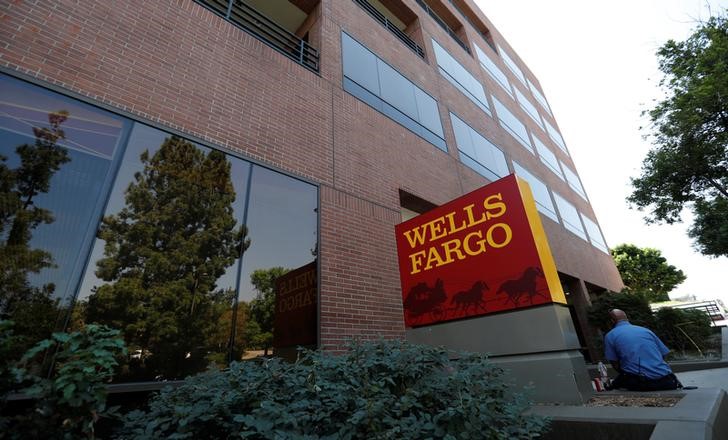By Ross Kerber
BOSTON (Reuters) - The Federal Reserve's surprise ban on Wells Fargo & Co (N:WFC) growing its balance sheet comes at a difficult juncture for the United States' third-largest lender.
The San Francisco-based bank has been dogged by higher expenses related to a long-running sales practices scandal and investors want it to reboot its revenue engine to help boost earnings.
But the U.S. central bank on Friday made it harder for Chief Executive Tim Sloan to ramp up lending with a rare, company-wide bar on Wells Fargo growing past the $1.95 trillion (£1.38 trillion) in assets it held at the end of last year.
The sanction, issued on Janet Yellen's last day as Fed chairwoman, will be lifted when Wells Fargo has shown it has improved its governance and controls.
Sloan said on Friday that the cap will cut the bank's annual profit by about $300 million to $400 million this year, equivalent to less than 2 percent of the profit it generated last year -- not a big financial hit.
To comply with the order while growing core loans and deposits, the bank will trim deposits from financial institutions and some commercial clients as well as some low-yielding trading assets.
The danger from clients being turned away is that it provides an opportunity for competitors such as JPMorgan (N:JPM), Bank of America (N:BAC) and Citigroup (N:C).
U.S. banks already expect revenues to climb and the profitability of their lending to rise this year due to lower corporate tax rates and higher interest rates.
Wells Fargo's balance sheet expanded steadily from the end of 2013 to 2016, but growth slowed dramatically last year as it battled to address the issues raised by the scandal.
"The growth limits will force Wells Fargo to slow down and that leaves room for others to pick up market share," said Michael Kon, portfolio manager and director of research at San Mateo-based Golub Group, which sold its stake in Wells Fargo, once around 400,000 shares, as the sales problems emerged.
"It will take a bigger decline in the price of WFC to get us interested again. We're looking for a wider margin of safety at this point," Kon said in a telephone interview.
A BUYING OPPORTUNITY?
Wells Fargo stock has risen 12 percent in the last 12 months, lagging the S&P Financials Sector's (SPSY) 26 percent increase as litigation expenses related to the scandal helped inflate its costs.
For all of 2017, the bank had costs of $58.5 billion, which translated into an efficiency ratio of 66.2 cents in costs per dollar of revenue, higher than its own target range of 55 to 59 cents.
The bank expects to spend less this year, estimating non-interest costs at up to $54.5 billion, but growing revenue would help it meet its efficiency ratio more easily.
After the Fed dropped its bombshell on Friday, Wells shares fell 6 percent in after hours trading.
For some investors, that presents a buying opportunity.
"Wells will get it right," said Christopher C. Grisanti of Grisanti Capital Management LLC in New York. "They have strategically assembled a terrific set of assets in and after the financial crisis, including the largest mortgage portfolio in the United States."
"We would be long term buyers in weakness."
The bank reached a $190 million settlement with U.S. authorities in 2016 over its employees opening accounts in customers' names without their permission to hit sales targets. The tally of fake accounts has since risen to potentially as many as 3.5 million. Separately, thousands of auto-loan and mortgage customers were potentially overcharged.
Since the 2016 settlement, Wells has taken steps to enhance oversight at the board level, centralize risk-management functions and install new executives to oversee key businesses and control functions. Its board chair, Betsy Duke, is a former Fed governor, and it recently hired Sarah Dahlgren, a former New York Fed official, as its head of regulatory relations.
The Fed said on Friday that the bank will replace three current board members by April and a fourth by the end of 2018. Wells had previously said it would add new directors this year, with three expected to retire before its April shareholder meeting.
The bank must submit a plan to the Fed within 60 days detailing how it has enhanced oversight from its board of directors and improved compliance and risk management functions, and how it plans to improve further.
Once the Fed approves those plans, Wells will hire third-party consultants to review them and monitor its progress until the regulator is satisfied.
Analysts do not expect the Fed to ease up under the leadership of its new chair, Jerome Powell.
"The bank will continue to face tough oversight," said John Heinlein, CEO of Horan Capital Management, in Maryland, which has about 316,000 Wells Fargo shares.

"Wells Fargo has its work cut out for it over the next few years."